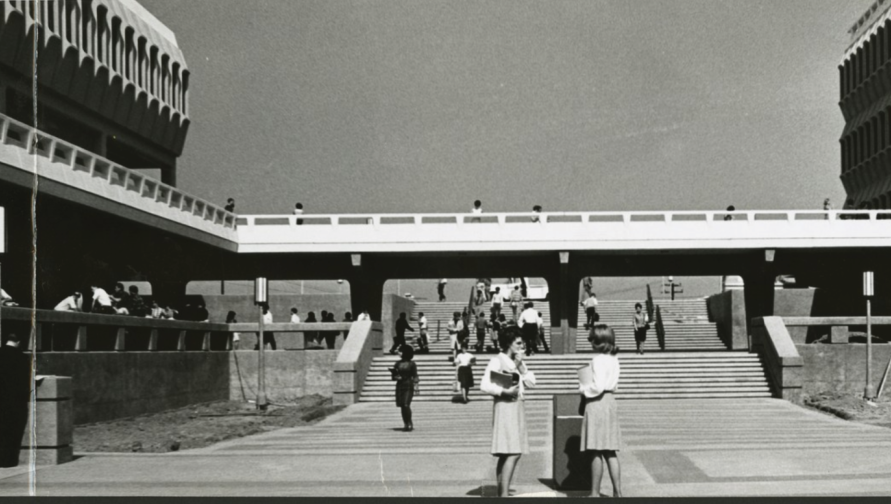
By Nikki Babri
With roots stretching back to the university's inception, Humanities Core has become a cornerstone of the UCI experience. From intimate seminars to encounters with world-class scholars, the program transforms students into thinkers, researchers and contributors to a global academic community. Over half a century later, the program continues to mold the academic journey of tens of thousands of UCI students, and set the stage for a lifetime of intellectual exploration.
Humanities Core was started in 1970 by Hazard S. Adams, a founding faculty member of UCI’s Department of English and Comparative Literature. It was designed to teach students the visual, oral, written (and now electronic) communication skills that are applicable across all academic disciplines. “Hum Core” is one of the oldest ongoing programs on campus – predating many academic departments.
“Humanities Core embodies what sets UCI apart,” reflects Chancellor Howard Gillman. “From the sciences to the arts, its impact is felt across campus, shaping students into critical thinkers and offering the tools needed to navigate our changing world. Its longstanding tradition at UCI speaks to its special place in our history.”
With its diverse array of subjects as expansive as the humanities themselves, including literature, film, history, philosophy, popular culture and visual art, Humanities Core introduces students to the many facets of human culture and thought. As a foundational course at UCI, it has come to define the first-year experience. Often cited by alumni as crucial to their positive experience at UCI, this community spans a student's entire academic journey and beyond.
“It’s a fabulous course, and I think other campuses have tried to replicate it and have struggled,” says Professor Emeritus Spencer Olin, who directed the Humanities Core course from 1989 to 1992 and served as dean of the School of Humanities shortly after. “It is enormously difficult to have faculty members from various departments work together collaboratively, but UCI conquered that way back in the early 1970s, and we’ve kept that course going now for [over] 50 years.”
Navigating a changing world

The program follows a three-year cycle centered around a chosen theme that provides perspectives on the human experience. Each year, anywhere from 800 to 900 students are enrolled. With a curriculum that spans the first three quarters of a student’s freshman year, students engage in seminars with the smallest class sizes on campus. This structure encourages close-knit relationships among peers and instructors, allowing hands-on learning experiences that are often exclusive to undergraduates attending small private universities. Previous Core themes have covered topics like The Human Condition (1982-85) and Empire and Its Ruins (2016-19). The current cycle, focused on Worldbuilding, is directed by Jonathan Alexander, Chancellor's Professor of English and informatics.
While Humanities Core is a mandatory experience for all first-year students in the humanities, and generously meets seven General Education requirements, its significance extends across campus. Approximately one-third of the student body in each class comprises humanities students, another third consists of Campuswide Honors Collegium students and the remaining third includes non-humanities students. With students from every school and major, the program remains committed to creating a comprehensive educational experience accessible to students from all backgrounds and fields of study.
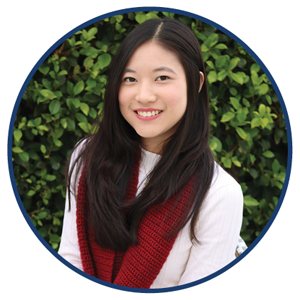
Michelle Bui ‘19 (B.A. biological sciences, minor in English) credits Humanities Core for widening her worldview. “As a BioSci major, I dedicated my college career to the ‘study of life.’ However, on my first day of Humanities Core, I learned that the humanities are also the study of life,” she shares. “While biology taught me how to gather evidence to make concrete observations about life, the humanities taught me how to gather perspectives to bring greater meaning to that which I observed. As an aspiring physician, I cannot think of a more brilliant combination in the pursuit of understanding and healing others.”
Support for students
With nearly half of UCI students identifying as first-generation, Humanities Core serves as a vital introduction to humanistic thinking. Along with Composition and Academic English, Core educates students from all schools on campus, including international students, and supports undergraduate writing university-wide. The program takes care to meet students where they are, honoring and acknowledging that their interests are worthy of studying – as seen by Core units covering topics like science fiction and queer video games – while exposing them to new cultural spheres.

Core comprises nine unique units presented by a group of faculty members from different disciplines. Through the dedicated efforts of scholars like Christopher Fan, assistant professor of English, Asian American studies and East Asian studies, students explore the complexities of identity, race and societal expectations. Drawing from personal narratives, Fan highlights the challenges faced by immigrants, including his own family's journey from Taiwan and the "model minority" stereotype. For students, Fan’s lectures about contemporary Asian American literature hit close to home – sometimes literally, as they include the Irvine resident and Taiwanese American author Charles Yu’s How to Live Safely in a Science Fictional Universe.
Fan's lectures challenge students to critically engage with their own backgrounds while recognizing shared struggles and aspirations. “Studying Asian American and Asian history and literature has helped me to realize how, when I was growing up in the suburbs of Houston, bemoaning how my family and I were so out of place, that there were so many people whose dreams and conflicts, desires and disappointments, were just the same as ours. My lectures try to shed light on these resonances and linkages.”
A lasting impact
Sharareh Frouzesh, an interdisciplinary scholar and Continuing Lecturer for Humanities Core, holds a unique connection to the program, having earned her bachelor’s, one of her master’s and her doctoral degree from UCI. As a philosophy major, she experienced Humanities Core during her freshman year from 1995-96 (under the theme “Ideas in Dispute”), describing it as one of the most memorable aspects of her undergraduate journey.
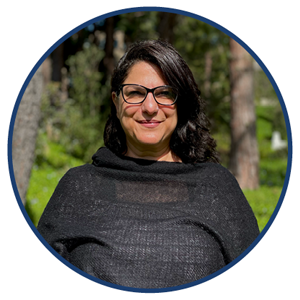
Frouzesh, whose scholarly work covers a wide range of topics including the psychoanalytical semiotics of antiblackness and Iranian resistance literature, returned to Humanities Core nearly thirty years later as an instructor and student mentor. Reflecting on her return, she is most struck by the enduring nature of the program's core values and formations, even amidst technological advancements.
“The format of nine distinct units delivered by an interdisciplinary cadre of current faculty and the unpredictable resonances and connections that come along the way – coupled with the extensive time students spend in discussions during section – enables forms of communication and thinking together I have yet to experience in any other program,” Frouzesh remarks. It is not for nothing, she adds, that the program remains one of the oldest and most respected institutions serving the undergraduate population at UCI. “The format, which enables deep engagement with a range of disciplines and texts within the Humanities, remains unmatched more than fifty years after its founding.”
As the COVID-19 pandemic reshaped the landscape of higher education, Serenity Thu Ritchey, a fourth-year student majoring in English and minoring in creative writing, found herself navigating a unique academic journey within the confines of virtual learning. Despite the challenges posed by remote instruction, Ritchey's experience with the Humanities Core program remained “vibrant, alive and intimate.”
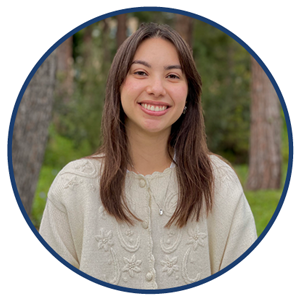
Ritchey, a first-generation student, initially grappled with feelings of imposter syndrome upon entering university. “I entered college thinking I needed to play ‘catch-up’ to avoid being outsmarted by my peers and professors but was happily proved wrong,” she explains. “In breakout rooms, my classmates were honest and vocal about sharing my sentiments, and I felt inspired, not threatened, by their curiosity and brightness. I relaxed, knowing I was where I needed to be.”
One of the defining aspects of Ritchey's experience with Humanities Core was the program's commitment to cultivating community. Despite the physical distance separating students, she formed lasting connections with classmates and section leaders, creating an online support network. “I count myself lucky to have been in a seminar with many other students in my major. I still talk to and am friends with classmates I met in section, and they’ve made lectures and workshop classes feel a little kinder. Some I’ll even graduate with this spring,” says Ritchey.
Bringing lectures to life
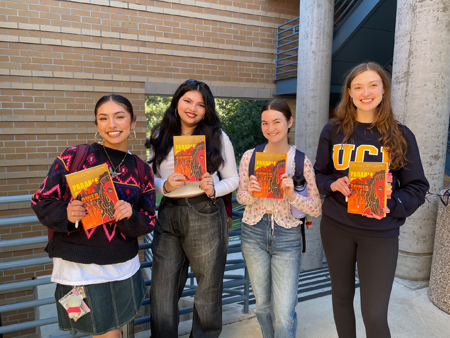
In partnership with Illuminations, Humanities Core puts world-class artists, creators and thinkers in contact with undergraduates. In the fall, students attended a forum with John Jennings, an award-winning graphic novelist and Afrofuturism scholar. To a crowd of over 150 students, Jennings, whose graphic novel adaptation of Octavia Butler’s Parable of the Sower was studied that quarter, discussed his creative journey and the need for greater diversity in media. The event concluded with a book signing session with a line of students out the building. Jennings took the time to connect with each student individually as they asked questions or shared their own stories. And this April, students will have the opportunity to hear from and meet Charles Yu.
Encouraging undergraduate research
Through a quarter-long research project, students are exposed to the research process, often for the first time, and learn by the end of the program that they themselves are researchers. This work also challenges the misconception that research is limited to disciplines outside of the humanities. Through engaging with multimodal resources and digital technology, they hone their skills in constructing arguments and interpreting data, fostering informational literacy that is crucial in the age of AI.

The program culminates in the Research Symposium, a collaborative effort between Humanities Core and the Undergraduate Research Opportunities Program (UROP) that showcases award-winning research projects selected from all majors. This annual event both celebrates students' intellectual pursuits and emphasizes the importance of their personal interests and passions.
This passion is equally felt by instructors. Following an evidence-based pedagogy, faculty meet weekly to evaluate progress and exchange ideas. Students also engage in reflective practices, sharing insights and advice for future classmates.
"The commitment of our lecturing faculty and our seminar instructors, as well as the enthusiastic engagement of our students, makes working in Humanities Core not only an intellectual delight, but an experience of worldbuilding itself,” shares current director, Jonathan Alexander. “Together, faculty and students from different backgrounds and interests create a community around the pursuit of vital and pressing questions within the humanities. Humanities Core not only commits itself to addressing such questions, but is itself the experience of building a world committed to a humanistic – and humane – understanding of what it means to be a scholar, thinker and educated citizen."
This is the first in a series highlighting foundational learning and innovative pedagogy in the School of Humanities. Stay tuned for articles about Composition, Academic English and the languages and sign up for our monthly newsletter.
